Cassie experienced a traumatic noontime event: a warm bath. One minute she had pats and scritches on the couch, the next minute her human herded her into the guest bathroom and hoisted her into the tub. Then she had utter confusion and her human rubbed her vigorously all over (which felt nice) while dumping pitchers of warm water on her (scary!).
She survived, of course, and promptly got a 30-minute walk to shake it off. She smells so much nicer, and her coat no longer has the greasy feel it had taken on in the last couple of weeks.
We'll see how long it lasts. I'm also washing the blankets I put over the two couches she likes to sleep on, which I hope helps keep the grime off a little longer.
On Friday I posted about Amtrak's $75 billion windfall from the Biden Infrastructure Bill, and I wondered whether the new Siemens Venture rolling stock would make it to Chicago. Well, I took the Wolverine to and from New Buffalo, Mich., over the weekend, and rode in them. My contact at Amtrak said the states of Illinois, Wisconsin, Indiana, and Michigan own them.
Photos and more details tomorrow.
When I moved to my current house, I planned to hook up my ancient cassette player to a stereo system in my library. So I got my ancient cassettes out of storage and brought them to the new place. It took a couple of stages (ordering bookshelves, getting the bookshelves, waiting for them to fix the adjustable shelf in the center bookshelf) over a few months. In that last phase it looked like this:
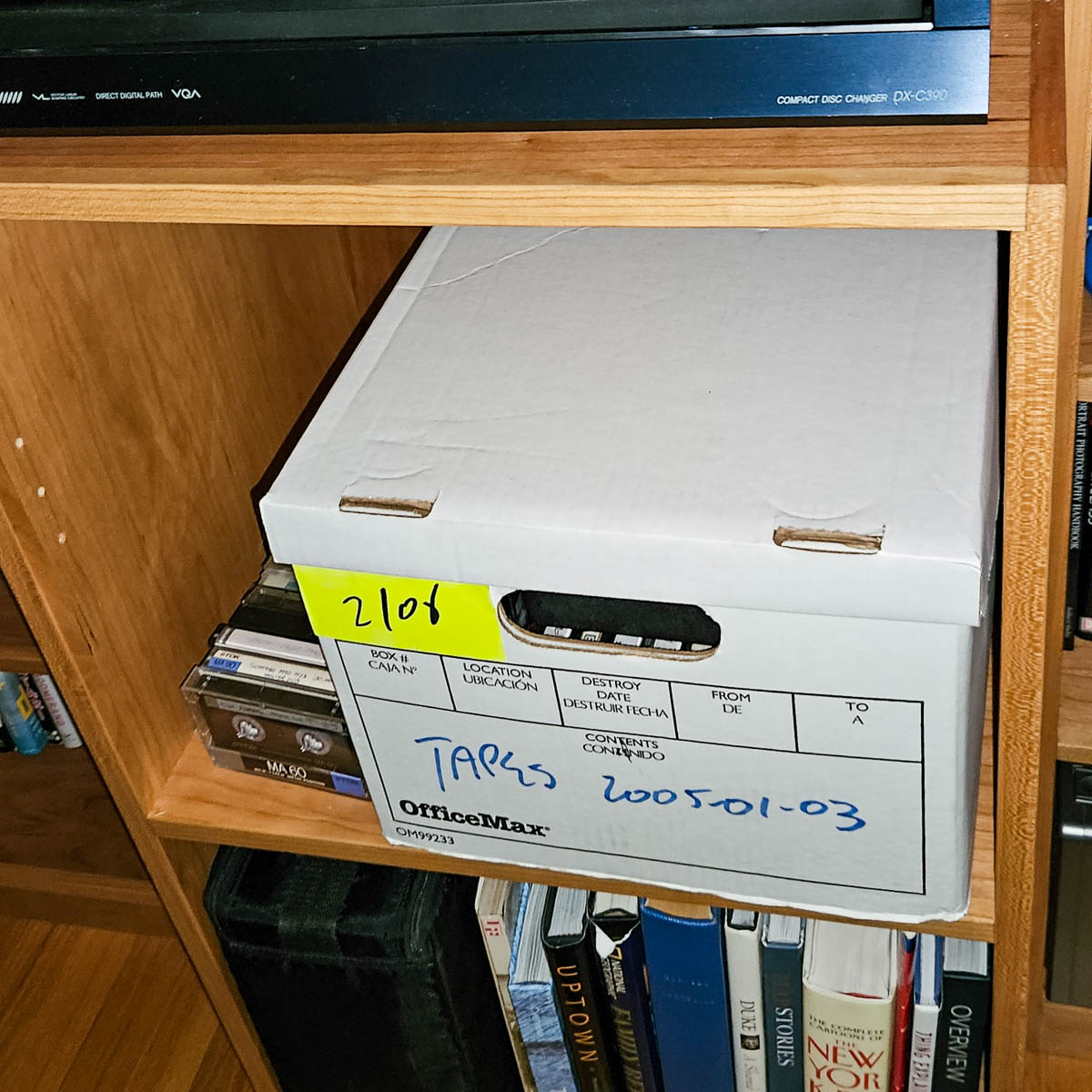
You're reading that right. I packed that box of cassettes on 3 January 2005, and put a sticker on it when I moved in February 2008 to confirm that the contents hadn't changed.
Over the July 4th weekend, I finally organized the cassettes, getting to this point:
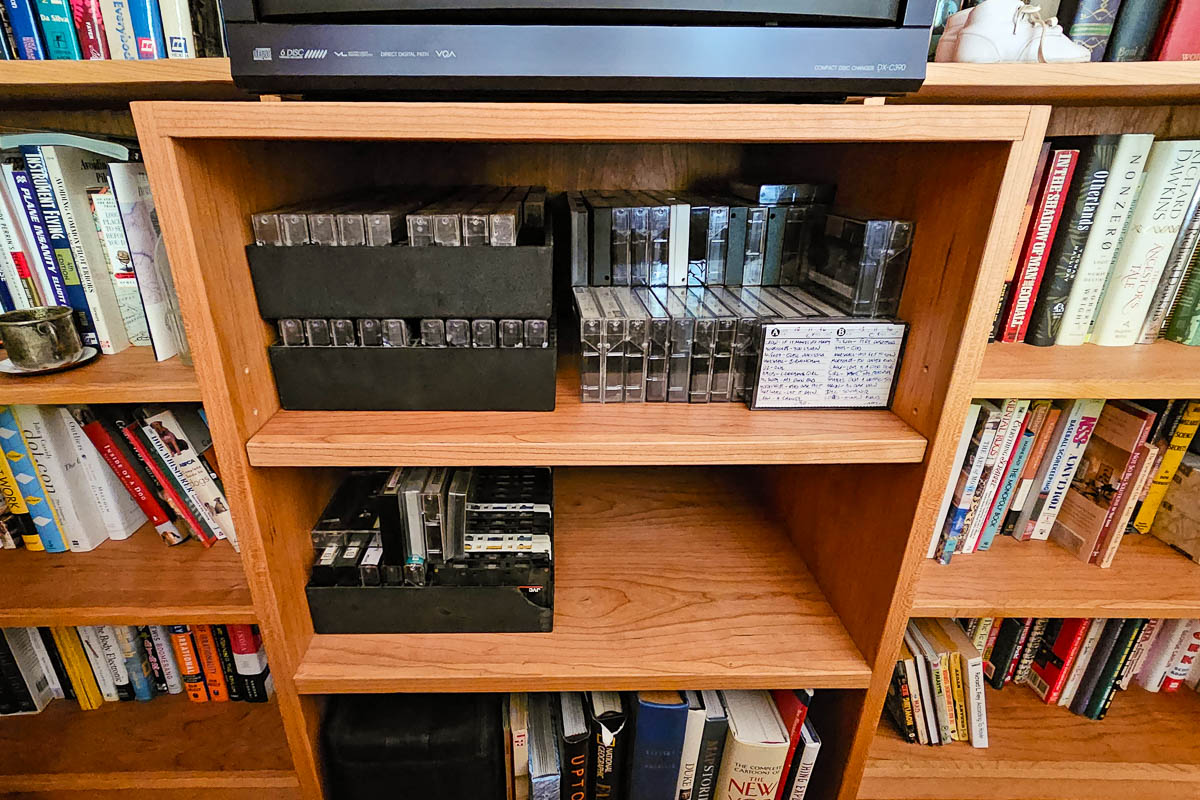
Much improved. And in order. So, naturally, I played the one marked "Samples," dated 4 June 1988, and realized I had no idea how to make a mix tape at that age.
Now, I've always had eclectic musical tastes, but apparently it took me 6 or 7 tapes to decide that a segue from Monteverdi's "Cantate Domino" (ca. 1620) to Lennon's "Because" (ca. 1969) might sound a bit jarring to most listeners, including future me. Still, I used to play all those tapes in my old Mazda while driving all over the country, so listening to them again put me right back in college.
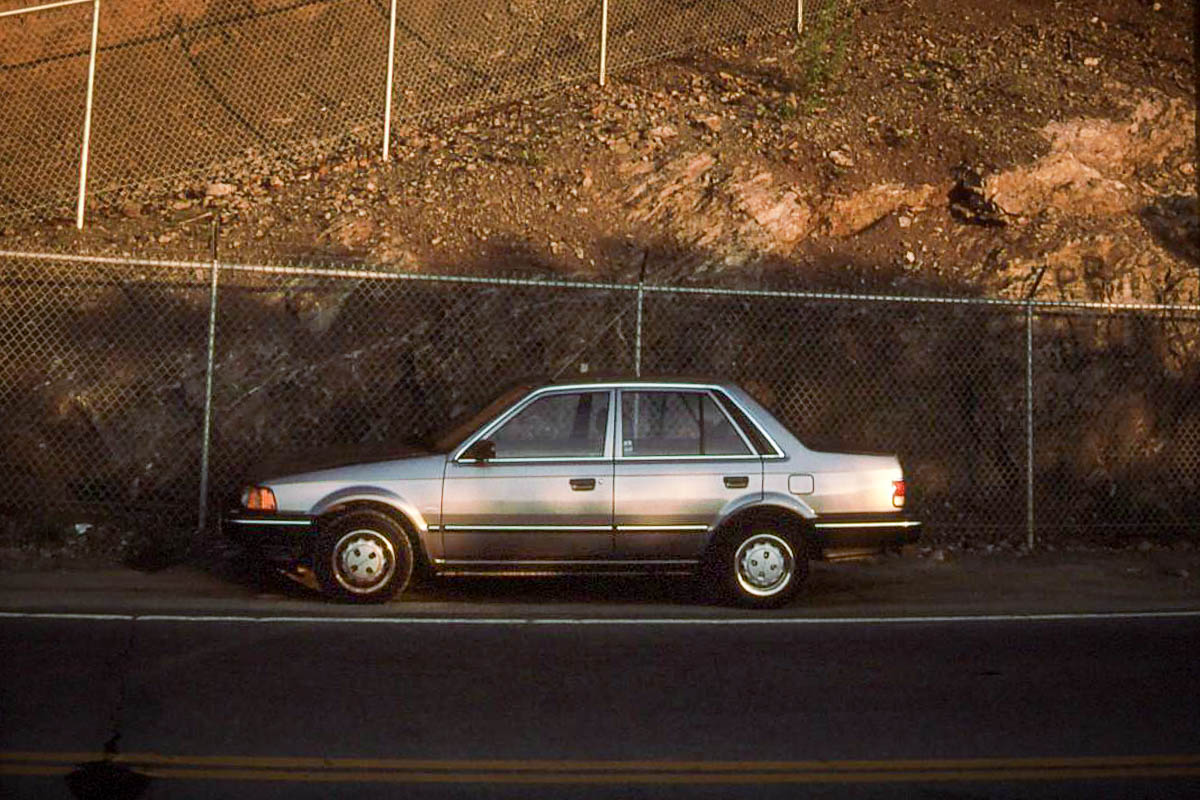
My old Mazda, June 1990, somewhere near Peekskill, N.Y. The first year I had her (around when I took this photo) I had driven about 24,000 km.
The United States has had an explosion of craft brewing in the past 15 years, thanks to relaxed regulations and a nearly-universal revulsion among serious beer drinkers for the mass-produced swill from the InBev/MillerCoors duopoly. One could argue, however, that the first true craft beer in the US came from San Francisco in 1896. Sadly, the 127-year-old Anchor Brewing Co. announced this week that it would cease operations and liquidate this summer:
In a press release, Anchor Brewing spokesperson Sam Singer said that economic pressures made business "no longer sustainable," and that employees were given their 60-day notice Wednesday. In June, Anchor Brewing limited distribution to California and axed one of its most popular beers.
“The inflationary impact of product costs in San Francisco is one factor,” Singer told SFGATE at the time. “Couple that with a highly competitive craft beer market and a historically costly steam brewing technique. [They’ve] probably been mulling over this decision for a year. It’s not something they take lightly.”
The Wednesday press release stated that the company plans to "provide transition support and separation packages" to outgoing employees, and that the Anchor Public Taps taproom on De Haro Street will remain open temporarily to sell remaining inventory. Brewing has ceased, but the brewery says it will continue to package and distribute beer on hand through the end of July.
Anchor Brewing also said Wednesday that attempts over the past year to find a buyer were unsuccessful, but one could emerge during the liquidation process.
When I first started drinking beer—believe it or not, I waited until I turned 21—I "trained" on the cheap, easily available Miller Genuine Draft, the thought of which now makes me gag. Fortunately, one of my uncles cured me of that by handing me an Anchor Steam Beer, showing me the difference between mass-produced pig urine and an actual, full-bodied beer. But still, until Goose Island started gaining ground in the late 1990s, Anchor Steam and Sam Adams Lager were the only choices for good, craft beer.
I'm sorry to see Anchor Brewing die. I haven't had an Anchor Steam in a long time, as they stopped distributing to the Midwest years ago, and my palate shifted away from lagers over the years. But if any of my California readers could do me a solid by snagging a six-pack of Anchor Steam anywhere they can find it, I'd owe you.
As predicted, the weather is great and I'm working from home with the windows open. And I'm doing an open-ended research project that is leaving me with more questions than answers, which is always good.
I haven't spent a lot of time online today, except for the research. But I would like to point out yesterday's Strong Towns post, which hit home almost literally. In most parts of the US, the suburban city plan (aka sprawl) gets a pretty heavy subsidy from urban property-tax payers:
A couple of years ago, I conducted an infrastructure study for the Town of Nolensville, Tennessee, at the request of Mayor Derek Adams, analyzing their tax revenues in relation to their development pattern's maintenance costs. You can find that study here, but I'm sure you can guess what I found, if you're a Strong Towns reader.
I looked at five different streets, each with a slightly different development pattern. I categorized these streets based on what infrastructure they contained, their levels of density, and their historic context. The final street on the list was a townhome street (consisting of typical 24-foot lot widths, as opposed to the 69- to 114-foot-wide lots of the other suburban streets). All four of the non-townhome lot development patterns resulted in long-term deficits for the city under the existing level of taxation. What's more, I adjusted these deficits to allow for the more expensive homes to contribute more taxes (since their higher assessments would, of course, generate more money in absolute terms), and they still didn't break even. The townhomes, on the other hand, produced a budget surplus of $51.43 per lot.
In the study's conclusion, I discussed how this result may be received politically. In the past, people have moved to towns like Nolensville precisely for the suburban development pattern. Even today, when more urban and traditional forms of community are increasing in popularity, not everybody wants to live in a townhome. Am I advocating some kind of 15-minute city conspiracy to forcibly abolish side yards?!?
No—despite the proven financial and logistical problems with suburbs, I don't think we should abolish them. It could be argued that heavy-handed strategies like that don't fit with our political culture and traditions in this country. Instead, I think we should do something eminently American: we should tell the suburbs to pull themselves up by their own bootstraps.
That doesn't mean abandoning them. Rather, it's a call for a frank, down-to-earth conversation between the taxpayers and the suburbs; the type of conversation any responsible parent would have with a teenager who's living beyond his means.
Sure, but if you're getting subsidized million-dollar housing, why would you ever vote to pay your actual bill?
OK, lunch is over. Back to the mines...
I'm in my downtown office today, with its floor-to-ceiling window that one could only open with a sledgehammer. The weather right now makes that approach pretty tempting. However, as that would be a career-limiting move, I'm trying to get as much done as possible to leave downtown on the 4:32 train instead of the 5:32. I can read these tomorrow in my home office, with the window open and the roofers on the farthest part of my complex from it:
Finally, does day drinking cause more harm than drinking at night? (Asking for a friend.)
The friend who took care of Cassie while I visited Europe last month invited us to the Morton Arboretum yesterday. We walked about 5½ km in the heat with multiple stops to let the dogs catch up on their panting:
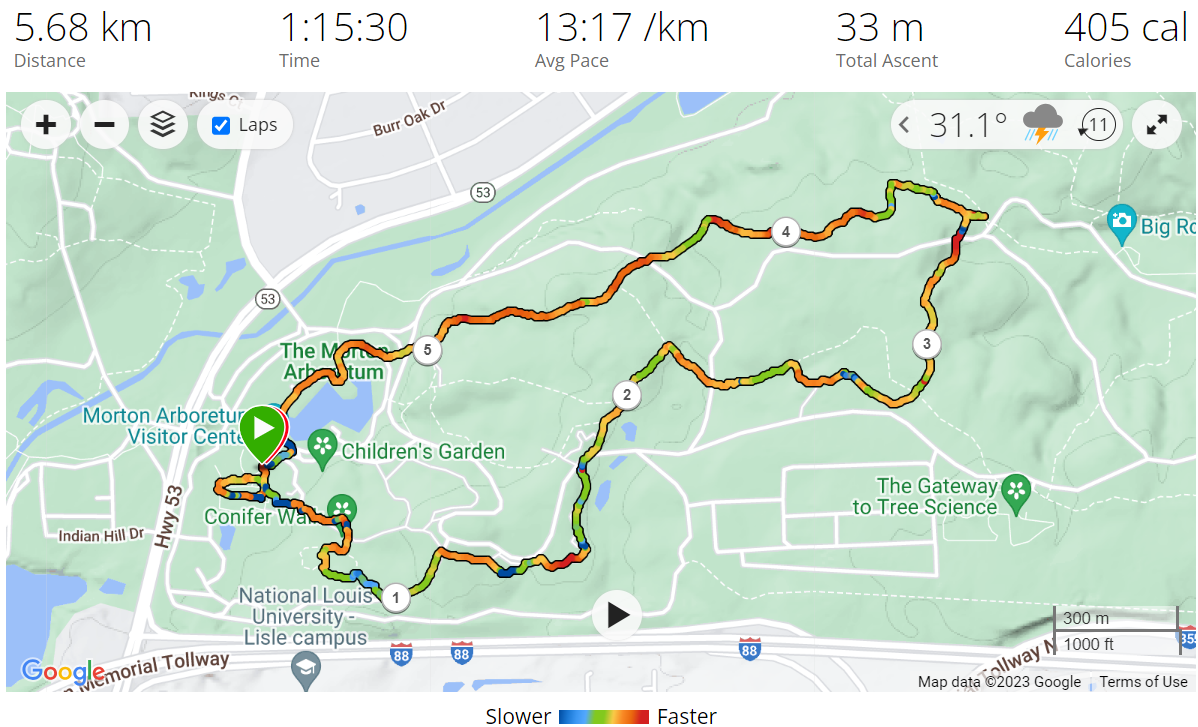
Later, on her favorite couch at my friend's house:

She's at day camp right now, so I expect she'll be completely exhausted by the time we get home tonight.
Because of yesterday's rain, poor Cassie only got 23 minutes of walkies yesterday—almost all of it in drenching rain. I went through two towels drying her off after each of her walks. And of course, because she was (a) being rained on and (b) couldn't smell anything, it took her way more time than I preferred to find where to do her job.
For my part, I really got a close shave on my step count:
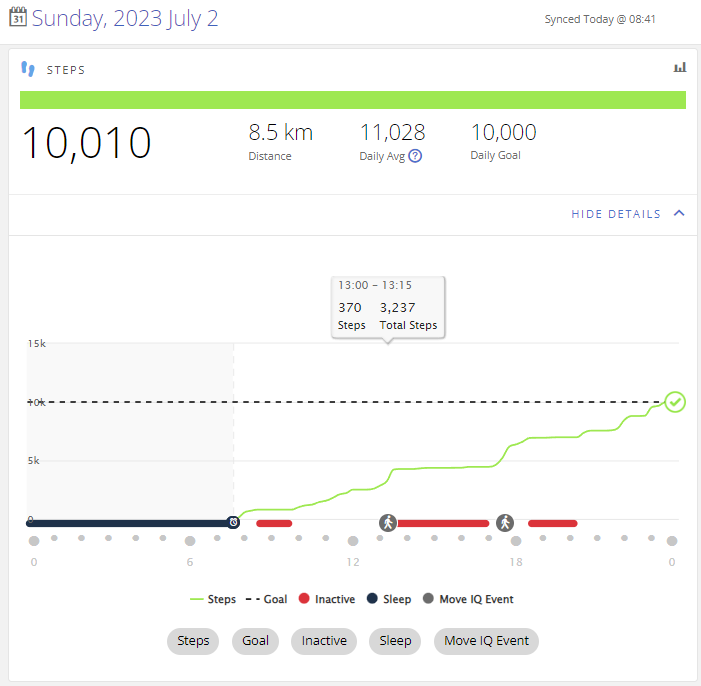
Today we have blue skies, sun, and a forecast high of 23°C: perfection. (The AQI is down to 47, too.) I have to do a few hours of work for a freelance client and get a bag of kibble, but other than that, I plan to take Cassie on several walks worthy of my dog.
I've got tickets to see Straight No Chaser with some chorus friends at Ravinia Park tonight—on the lawn. Unfortunately, for the last 8 hours or so, our weather radar has looked like this:
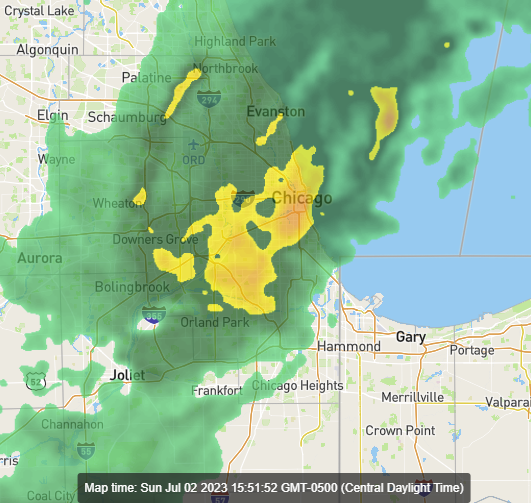
I haven't got nearly as much disappointment as the folks sitting in Grant Park right now waiting for a NASCAR race that will never happen in this epic rainfall. (I think Mother Nature is trying to tell NASCAR something. Or at least trying to tell Chicago NASCAR fans something. Hard to tell.)
While I'm waiting to see if it will actually stop raining before my train leaves at 5:49pm, I have this to read:
I am happy the roofers finished my side of my housing development already. The people across the courtyard have discovered the temporary waterproofing was a bit more temporary than the roofers intended.
Welcome to July. Hard to believe, right?
I'm traveling today so regular posting continues tomorrow.
And happy birthday, Canada.